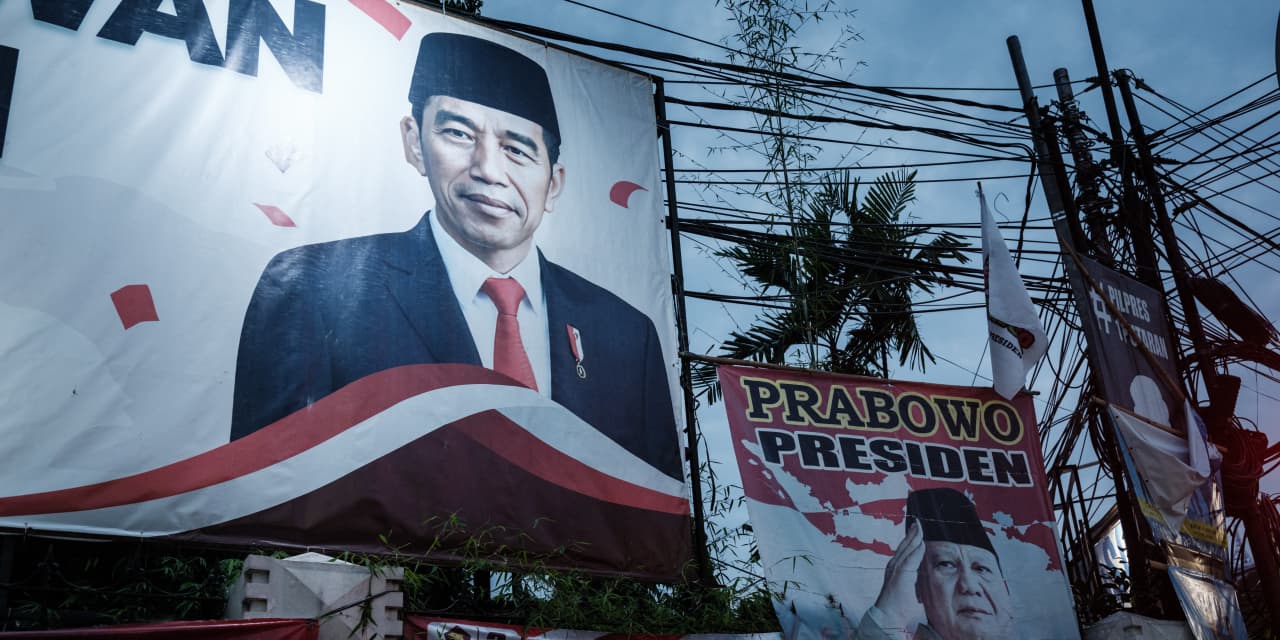Indonesia will go the polls on Wednesday to elect a new president to replace Joko Widodo. The vote’s importance should not be underestimated.
Covering 17,000 islands across South East Asia and Oceania — including Java and Sumatra — the republic has important geopolitical and global economic clout.
With about 280 million inhabitants, encompassing an estimated 1,300 ethnic groups, Indonesia is the world’s fourth-most populous country, the third-biggest democracy, the 16th biggest economy — ahead of Turkey, Saudi Arabia and Switzerland — and the third-best performing stock market over the past 20 years.
And as the biggest Muslim nation enjoying relatively good relations with both the U.S. and China, the administration in the capital Jakarta is positioned as a crucial bridge between East and West.
That balancing act between the world’s two biggest economies also has protected Indonesia’s commercial interests — though it also helps to have lots of stuff that other country’s want. For example, the vast archipelagic state is the world’s biggest producer of palm oil and contains the globe’s largest deposits of nickel.
Indonesia’s economic growth has stabilized since President Joko Widodo took office in 2014, with the country achieving 5% growth each year since then, COVID pandemic aside.
Widodo’s desire to move the country away from its dependence on agriculture saw him curtail exports of nickel ore and bauxite to encourage battery-makers and refiners to set up domestic production.
By also reducing employment red tape and opening up sectors to foreign entities the amount of foreign direct investment, notably from car companies, miners and refiners, has surged to a record, some $47 billion in 2023, according to Statistics Indonesia. The resulting jump in exports has moved the country’s current account balance from a $30 billion deficit in 2028 to its current surplus.
Indeed, Indonesia’s economic statistics would be the envy of many developed nations. According to the International Monetary Fund, Indonesia’s inflation rate is 2.5%, the unemployment rate is 5.2% and general government gross debt as a percentage of GDP is 39%, similar to Ireland and notably lower than the U.S. on 127%.
Unsurprisingly, investors have welcomed this backdrop. According to Bloomberg, the MSCI Indonesia Index, which U.S. investors can track using the iShares MSCI Indonesia ETF
EIDO,
is near a record high, having risen about 380% over the past 20 years, behind only the S&P 500 on about 480% and MSCI India on about 600%.
The yield spread between Indonesia’s 10-year government bond
BX:LDBMKID-10Y
and the equivalent maturity U.S. paper is 245 basis points, according to FactSet. That’s historically relatively tight for an emerging economy and for comparison, India’s 10-year yield spread with the U.S. is 292 basis points.
Consequently, markets hope for more of the same. They are expected to get it with former general Prabowo Subianto, who is the current defense minister, commanding a wide lead in the polls.
Prabowo has been accused by human rights groups of being involved in killing civilians in East Timor in the 1980’s when a young army officer, accusations he has always denied. Crucially, Parbowo is the favored candidate of Wikodo, and his running mate is Gibran Rakabuming Raka, mayor of Surakarta, and the current president’s eldest son.
The other main two candidates are Anies Baswedan, the ex governor of Jakarta, and Ganjar Pranowo, ex governor of Central Java.
“An expected Prabowo lead on 14-Feb could strengthen expectations of industrial policy continuity,” said a team of strategists at Citi, led by Johanna Chua. “Yet, from a fixed-income standpoint, uncertainty on Indonesia’s fiscal regime could heighten, though not yet by enough to overshadow the near-term monetary policy outlook.”
Even just ending election uncertainty could support markets, suggested some analysts. “If a presidential winner is determined after the first round, we expect markets are likely to rally as election risks dissipate,” said Arjun Varma, economist at Goldman Sachs.
Quick exit poll results will likely be announced later on Wednesday. The official result will be released at the latest on March 20. If no one wins the first round, by getting 50% or more of the vote, the second round of voting is scheduled for June 26.







